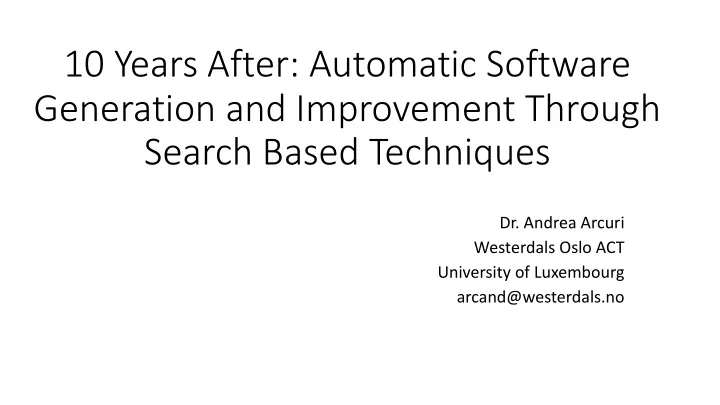

10 Years After: Automatic Software Generation and Improvement Through Search Based Techniques Dr. Andrea Arcuri Westerdals Oslo ACT University of Luxembourg arcand@westerdals.no
While in my first year of PhD in 2006-2007 • Working on SBST for unit testing • tools and theory • Research group on evolutionary computation, not software engineering (SE) • Meeting with supervisor/post-docs, discussion about co-evolution • Q: “Any problem in SE that can be addressed with co- evolution???”
Literally, a solution in search of a problem …
tests with what??? Hmmmm, co-evolving te Hmmmm, pr grams ? progr • Use Genetic Programming (GP) to evolve programs • Eg, for machine-learning classifiers • Use SBST to evolve test cases • But co-evolving them to achieve what? • What is the fitness function here???
What about automatically generate code from formal specifications? • You use SBST to generate some tests • Formal specification used as oracle for the tests • Use GP to evolve programs to pass all tests • Then evolve new tests, and keep on as co-evolution…
Programs Test Cases Programs Test Cases Programs …
Did it work??? • Already struggled on toy examples like a bubble-sort … • … and anyway, who the heck writes formal specifications??? • But could still publish a couple of papers though… • ASE’07 and INS • Time for (yet) a new PhD topic???
From failure to “simpler” problems… • Full code generation didn’t work • But what if I try from a simpler case where program is nearly complete? • … actually not a so silly question as it sounds...
Bug Fixing • A program with bugs is a “nearly” complete program • Use it as seeding for first generation of GP • It worked fine on some toy examples… • But still issues with formal specifications … without it cannot use co-evolution (as used for automated oracle)
• Who cares about the hammer /co- evolution? • … throw it away if it doesn’t work!!! • “repairing” a program on a fixed set of test cases is a real SE problem • ... done manually by millions of engineers every day... • A lot of work done in the last 10 years by different researchers
Can get something useful out of co-evolution? • Discussion with David R. White … 2007-2008 • Both in SEBASE project • Me PhD student in Birmingham, he in York • … after few beers... what if: • original program as oracle for functional correctness • second objective: optimize for performance • would co-evolution work here? • can we genetically improve an existing program to make it faster?
MOO
Quite different from what compilers do
Did it work? • Small functions • Found quite a few non-trivial improvements that compilers cannot do • … so, somehow yes
In Retrospective… • Haven’t worked on such topics since finishing PhD in 2009 • got more focused on software testing • Curiosity-driven research on uncharted territories is high risk • I got lucky to get publishable results • Maybe not really best for a PhD main topic… • In industry, plenty of “problems” that need a “solution” • Need to find right balance in SE research
Conclusion • Bug Fixing and Genetic Improvement were “lucky” accidents • At that time 2007-2009 results just on small functions • But shown it was feasible • Looking forward to next talks to see the current status ;)
References • Coevolving programs and unit tests from their specification, Arcuri and Yao, ASE’07 • A novel co-evolutionary approach to automatic software bug fixing , Arcuri and Yao, CEC’08 • Multi-objective improvement of software using co-evolution and smart seeding, Arcuri, White, Clark and Yao, SEAL’08 • Automatic software generation and improvement through search based techniques, Arcuri, PhD 2009 • Evolutionary repair of faulty software , Arcuri, ASoC’11 • Evolutionary improvement of programs , White, Arcuri and Clark, TEVC’11
Recommend
More recommend